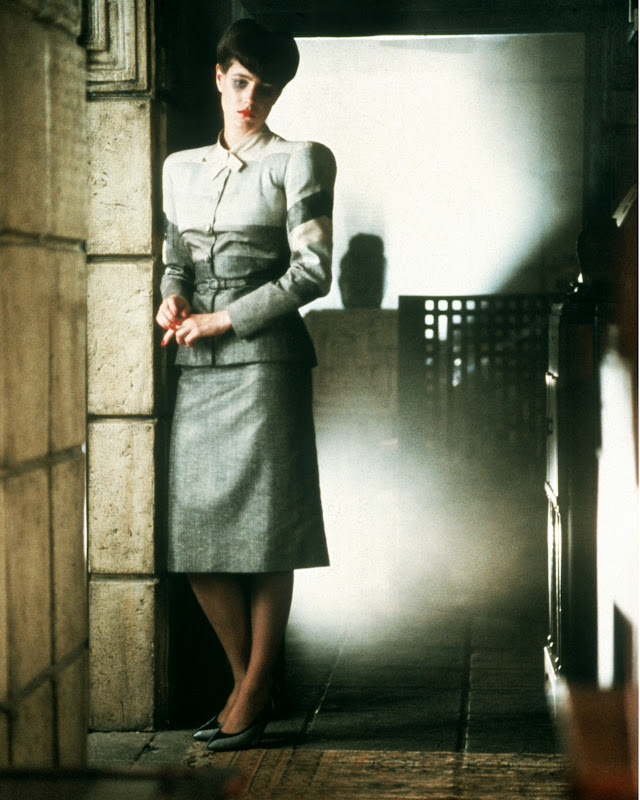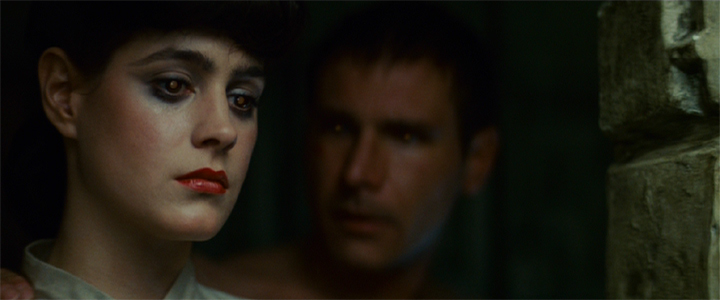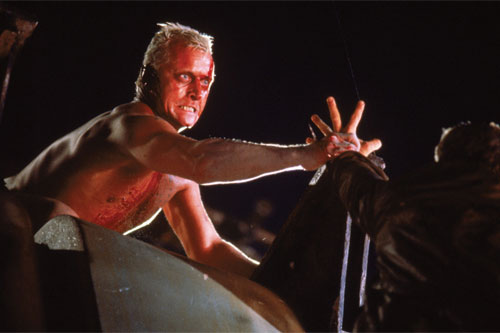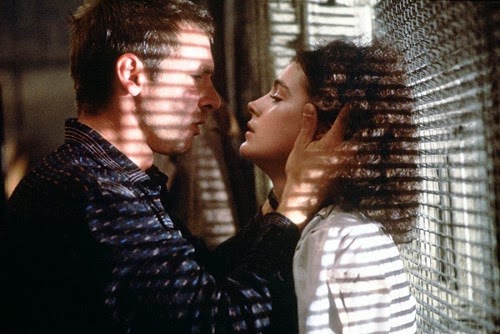I love “Blade Runner.” Always have, always will.
But having watched its various iterations (with narration, without narration, director’s cut, workprint, etc.) more times than I can count, I came to a rather disturbing realization about the film a few years ago, one that I’d completely missed in all my earlier viewings. And I haven’t been able to look at “Blade Runner” the same way since.
For the uninitiated (and I’m assuming there are precious few of you), “Blade Runner” is the 1982 science fiction film written by Hampton Fancher and David Peoples, based on Philip K. Dick’s novel “Do Androids Dream of Electric Sheep?,” and directed by Ridley Scott. In it, Harrison Ford plays Rick Deckard, a veteran “blade runner”—a cop who specializes in hunting down and killing renegade androids known as replicants. We’re introduced to Deckard as he’s forced out of retirement and ordered to track down four replicants, led by Roy Batty (Rutger Hauer), who have illegally come to earth seeking a way to extend their built-in four-year lifespans.

“Blade Runner” is commonly regarded as one of the greatest science fiction films of all time, and you won’t have to look very hard to find any number of awards, nominations, and rave reviews the film has garnered. Its gorgeous cinematography and production design have influenced countless other films, and, in 1994, it was selected by the Library of Congress for preservation in the U.S. Film Registry as being “culturally, historically, or aesthetically significant.” In a 2007 interview with Wired magazine, director Scott calls it “probably” the most personal of his films.
So this isn’t a film to be trifled with. And yet…I must. Because there’s something about “Blade Runner,” towering achievement though it may be, that I haven’t been able to let go of once I finally zeroed in on it. See, as he carries out his mission to track down and kill the replicants, Rick Deckard is presented to us in no uncertain terms as the hero of “Blade Runner.”
But he’s not. He’s the villain.
Here’s how I arrived at such a conclusion: some years ago, I came across an article that explored “Blade Runner” in depth. It praised the film, as most articles about “Blade Runner” tend to, but was critical of a scene in which Deckard rapes the female lead, a replicant named Rachael (Sean Young).
And that’s where I stopped reading. “Rape?,” I still remember thinking. “No, that’s not what happened.” To be sure, there is a sex scene between Deckard and Rachael, but in my memory, it was unambiguously consensual. So I dismissed the article as nonsense and continued on my merry way, with “Blade Runner” resting comfortably on the sci-fi pedestal on which I’d placed it.

It was maybe a year later that I decided to revisit the film, partly just for enjoyment, and partly to specifically watch for that so-called rape scene so I could put that silly article out of my mind once and for all. And as it turned out, I was wrong and the article was right.
Here’s the scene in a nutshell: Rachael’s with Deckard in his apartment. They’re sitting together at his piano when he tries to kiss her. She pulls back, then jumps up and races for the door (the shaky handheld camerawork emphasizing her urgency and determination to leave). She opens the door, but Deckard jumps in front of her—looking quite angry, mind you—and slams it shut with his fist, then grabs her with both hands and physically slams her against the window.
That’s our hero in action.
Then, as if all that weren’t creepy enough, he orders her to say, “Kiss me.” She doesn’t want to, so he orders her again. This time she says it. He kisses her (because, hey, she just told him to, right?), she kisses him back, and they continue as we fade to black.
To be fair, there’s an argument to be made that the scene is probably attempting a certain level of emotional complexity here. Rachael is a replicant of an advanced design. She’s had the memories of her creator’s niece implanted in her mind, leading her to believe that she’s actually human. Anyway, the idea seems to be that she and Deckard are both overcome with passion, but she’s resisting because (having been dismissively told by Deckard that she’s actually an android) she can’t trust her emotions. But the basic thrust (sorry) of the scene remains the same: Deckard wants sex, he wants it right now, and she does not. So he literally holds her hostage until she agrees to give it up.
As I sat there watching this scene, feeling like I was really seeing Deckard for the first time, I had no choice but to view him differently. And I couldn’t help but wonder, “Okay, I was wrong about that scene…what else was I wrong about with this film?”
The next most shocking moment—again, one that I’d seen many times previously, but only noticed for the first time now—comes near the very end. Deckard battles Roy on the rooftop of a rain-slicked skyscraper. Attempting to jump from one building to another, Deckard falls short and ends up dangling from the edge with one hand. Roy stands over him, watching as Deckard’s grip slowly slips. And as he finally lets go, knowing that he’s about to plunge to his death, what does Deckard do?

He spits at Roy. That’s what he does with what he believes is his dying breath.
I think I’d missed the spitting on all my previous viewings because the scene is dark and rainy, and it happens in a split-second. But this time, my antennae were up, and I was on the lookout for anything that might tell me something about Deckard that I hadn’t known before. And when I saw him spit at Roy, I said to myself, “Whoa…I fucking hate this guy.”
If you’ve read this far, you undoubtedly know that Roy grabs Deckard at the last possible moment and lifts him onto the roof, thereby saving his life. And that made the spitting even more distasteful to me: Deckard was defeated—by an opponent who never once caused him any harm, mind you—yet he has so much hatred in his heart for Roy (for reasons the film never bothers to explain) that he decides to waste his final moment expressing all the anger and contempt he could muster.
Why did he hate Roy that much? Deckard didn’t even want the replicant-killing assignment in the first place; he only took it because his former boss gave him no choice. And yet there he was, acting as if he were Ahab and Roy his white whale. It actually shocked me.
And that’s when I realized that Deckard was really the bad guy all along. Every single thing he does in the film is either dishonorable, motivated by pure self-interest, or both.
Okay. But if Deckard’s the villain, who’s the hero of “Blade Runner”?
Roy Batty, of course.

Roy is the polar opposite of Deckard. He’s ostensibly the film’s villain, but despite Ridley Scott’s admission that Deckard is himself a replicant (an interpretation of the film that I never quite got on board with), the two couldn’t be more different. Roy and his three replicant friends function very much like a family. Deckard has no one. Roy grieves when his fellow family members are killed, and is genuinely anguished as he murders his creator Tyrell (Joe Turkel). Deckard shoots replicant Zhora (played by Joanna Cassidy) in the back like it’s just another day at the office. And it’s probably belaboring the point to mention that the only two of the four replicants Deckard actually manages to kill happen to be women, but that doesn’t make it any less true.
Ultimately, pretty much every action that can be described as “good” or “noble” in “Blade Runner” is done by Roy. All he wants for himself and his merry band of replicants is the same thing any of us want: more life. As much as possible. And although he’s not above killing in pursuit of his goal, Roy’s not some bloodthirsty rage-monster who delights in human suffering. In fact, I would argue that if there had been a way for Roy to get what he wanted without harming anyone, he certainly would have taken that option.
Finally, it could be said that Deckard “finds his humanity” at the very end of the film once Roy saves his life. It’s possible. But for me, by the time Roy makes his amazing dying speech on that rainy rooftop, my sympathies have swung so far in Roy’s direction that I can’t muster up any real interest in the resolution of Deckard’s journey, or his reunion with Rachael in the closing scene.
Because by that time, “Blade Runner” has already verbalized my shifting relationship with the film by giving Roy another key line of dialogue. When Deckard shoots at him and misses, Roy taunts, “Not very sporting to fire on an unarmed opponent! I thought you were supposed to be good!”
So did I, Roy. So did I.











